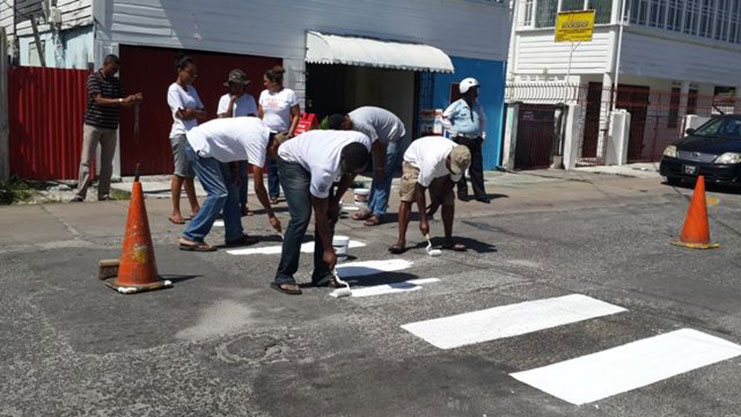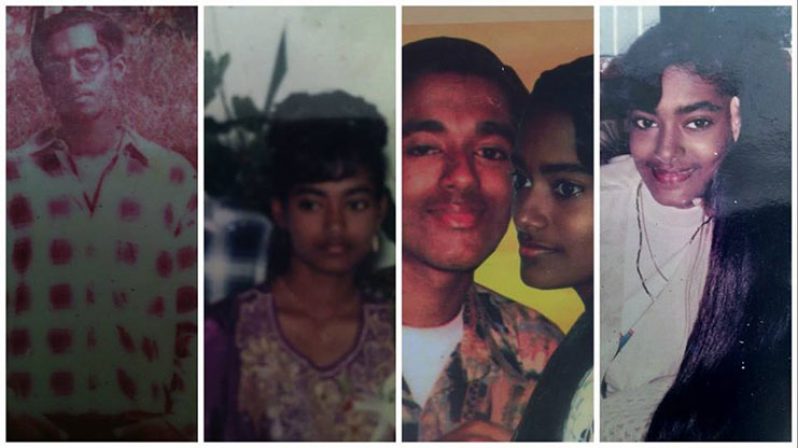How Mothers in Black turned grief into activism
By Ravena Gildharie
WITH heavy hearts and staunch determination, they stood at the helm of the picket line in front of Parliament Buildings in downtown Georgetown for four years during the late 1990s, lobbying Guyanese legislators for necessary changes to traffic laws, rules and regulations that would strengthen the safety and security of all road users in the country. It was no easy task, but with commitment and purpose, the Mothers in Black eventually saw road safety legislation passed in Guyana for the use of helmets, seat belts, breathalyzers and radar guns.
Back in 1998, one of the two women behind the early `Mothers in Black’ movement was Lucille Bacchus of Lusignan, East Coast Demerara, who lost both of her children in an accident in November 1996. Her son, Wally, 17, and daughter, Fareena, 16, were on a motorcycle traversing the Strathspey, East Coast Demerara, public road when an alleged drunk driver collided with the teenagers after hitting another motorcycle with a pillion rider, and thereafter losing control of his car. The Bacchus teens were at the time returning from Enmore.

“I have been crying every day since my children died. It is a pain that don’t ever go away. It is a pain I don’t want any other person to ever feel and have to go through what I am going through. That is why I try my best to advocate road safety and create awareness that no one else has to suffer the loss I have suffered,” a tearful Bacchus related to the Pepperpot Magazine, during an exclusive interview. This November marks the 21st death anniversary of her deceased children. The late, Wally, succumbed to internal injuries just hours after the accident on November 16 while his sister, died in Trinidad seven days later.
“It has been 21 years, but I still feel like it happened yesterday…I worked hard to give my children a good education and I never got to see them make something of it…I miss my children dearly,” Bacchus stated. She recalled that the late teenagers were preparing for graduation from secondary school; her son was a former Bishop’s High student while her daughter had attended St Stanislaus’ College.
The grief was so immense, it sent Bacchus into severe depression and it also affected her health, marriage and family life. However, she found some solace in a bond with another mother, Denise Dias, who lost her 17-year-old daughter, Alicea, in an accident reportedly involving a drunken driver too, in August 1996. Dias subsequently formed the `Alicea Foundation’ from which evolved `Mothers in Black’. Dias has been at the forefront of the non-profit road safety movement and has received national, regional and international attention for advocacy and successes over the years. Dias participated twice in the Bill Clinton’s Global Initiative Conference in New York where she was invited to share her story about road safety and the `Mothers in Black’ movement.
Reflecting on the earlier years, Bacchus recalled that though they conducted two years of road safety advocacy under the `Alicea Foundation’, the women were driven to up their campaign in 1998 after a fatal crash on Mash Day which resulted in the deaths of several persons including small children.
Dressed in black and armed with pictures of their lost loved ones, the women peacefully protested, and gained growing support as they continued day after day in front of the Parliament Building. They led a convoy of vehicles on a ‘Drive with Care’ campaign from Georgetown to Plaisance, seeking to draw attention to the speed limits that were instituted at the time, and which were believed to be contributing to speeding. Bacchus remembered that the group was pulled over during the campaign at the Sparendaam Police Station for obstructing traffic.

SEAT BELT LAW AND ROAD SAFETY ADVOCACY
Amendments to the Motor Vehicles and Road Traffic Act in 2002 saw enforcement of the seat belt law, which still stirs some degree of uneasiness among drivers and road users. The most important section of the Act stipulates that “every motor vehicle shall appropriately be equipped with a seat belt assembly for the front seats for the driver and every passenger” and prescribes a maximum penalty of $10,000. A person who sits in the front seat of a vehicle and does not wear a seatbelt is liable to the penalty. In cases where a child travels in the front seat, the child, the Act stipulates, must be fitted with an appropriate child restraint system.
Fifteen years since the seat belt law was enforced, Bacchus explained that enforcement is still crucial to saving lives. She noted issues of speeding and drinking and driving as social issues that each individual must stand up against.
“How can a mother, or a parent sit in a car or a minibus with their child or children and not say anything to a driver that is speeding or driving in a drunken state? The onus is on you to protect your life and others. Each and every one of us needs to speak out against these kinds of behaviours on the roads,” Bacchus implored.
She noted that in the case of her children, the involved driver was given a three-year sentence for causing death by dangerous driving, but ended up serving an 18-month sentence. To this day, she remembers her son’s final words to her: “Mom, we were in the corner. We were not wrong. We couldn’t do anything. He came and hit us.”
“Every time I see another accident and someone loses their life, it pains me terribly like a fresh hurt all over again and I want to stop it,” Bacchus indicated.

Over the years since, the `Mothers in Black’ has grown significantly with more mothers and supporters joining the movement. They have led numerous awareness campaigns and road safety advocacy including the painting of road crossings, training of drivers in the public and private sectors as well as school children; awareness talks, sessions and marches. Each year, the Mothers partner with the Guyana National Road Safety Council (GNRSC) to observe World Day of Remembrance for Road Traffic Victims. They also conduct counselling and offer support services to survivors and relatives of accident victims.
Though their activities have somewhat toned down in recent times, `Mothers in Black’ is still alive and committed to road safety.
GNRC’s Romona Doorgen said the Council recognises the `Mothers in Black’ as a vital road safety partner and a strong support voice for victims and survivors due to the personal experiences of members. Working in collaboration with the Pan-American Health Organisation (PAHO), GNRSC is moving to conduct training of professional counsellors for accidents survivors and relatives.
She noted that over the years the national road safety movement has attracted increased support from public and private sector entities as well as non-governmental organisations (NGOs) and others who all recognise road safety as a serious issue. A road safety advocate for 11 years, Doorgen stressed the need for more educational programmes to ensure every citizen, young and old, understands and embrace road safety practices.



.jpg)











